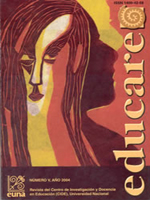Escala de actitudes hacia la tecnología en la labor docente aplicada a profesores de primaria de informática educativa en Costa Rica. Análisis de validez y confiabilidad
DOI:
https://doi.org/10.15359/ree.2004-5.5Abstract
Artículo retractado. This paper examines the results obtained from the validity and reliability analysis of the constructed “Attitudes Toward Technology in Teaching” scale. Data were collected from 319 tutors and teachers of educational informatics working in Costa Rican public primary schools. The schools work under the National Program on Educational Informatics for grades I to VI of the Costa Rican Ministry of Education and the Omar Dengo Foundation. The scale was first composed of 115 items which sere divided into eleven categories. Further analysis allowed a reordering of the categories and the removal of several items with factor loadings lower than 0.4 and correlations lower than 0.3. The reliability analysis resulted in a Cronbach's coefficient alpha of 0.8985, leading to the conclusion that the scale is reliable. Finally, taking into account the obtained results, a new scales was constructed with 41 items, grouped in seven categories and subdivided into two dimensions.
References
Amón, J. (1993). Estadística para psicólogos 2. Madrid: Ediciones Pirámide.
Castro, R. (2003). Actitudes de tutores y tutoras de informática educativa hacia la tecnología en la educación y el aprendizaje. Documento de trabajo. Departamento de Investigación, Fundación Ornar Dengo.
Cohen, L. y Manion, L. ( 1990). Métodos de investigación educativa. España: Ediciones La Muralla.
Downie, N. y Heath, R. (1973). Métodos estadísticos aplicados. México
D.F.: HARLA, S.A.
Franton, C. Green, K. y Hoffman, E. (2002). Measure Development: The Children 's Attitudes Toward Technology Scale (CATS). En: Journal of Educational Computing Research. 26(3), 249-263.
Hernández, R. et al. (2000). Metodología de la investigación. México D.F.: Me Graw Hill.
Lignan, L. (2002). Actitudes de los alumnos y maestros hacia la computadora y los medios para el aprendizaje. Publicación en líneahttp://investigacion.ilce.edu.mx/dice/proyectos/actitudeslactit9.htm. Fecha de consulta: 9 de octubre del 2003.
Lignan, L. (2002). Validación del cuestionario sobre las actitudes de los
maestros hacia la computadora. Documentos de la Sociedad Mexicana de Computación, México. Publicación en línea http://www.te.ipn.mx/files/f000504/txt.docto.htm. Fecha de consulta: 27 de febrero del 2003.
Mitra, A. (2002). Toward Developing Questionnaire Items to Measure
Effectiver1:ess of Computers in Teaching. En: Journal of Educational Computing Research. 26( 4 ), 381-394.
Myint Swe, K. (2001). Attitudes Toward Computers Among Teachers
Education Students in Brunei Darussalam. En: International Journal of
Instructional Media. 28(2), 147.
Rodríguez, J. (2002). Marco evaluativo de impacto social con perspectiva de equidad para programas educativos mediados por TIC. Documento de trabajo. Departamento de Investigación, Fundación Ornar Dengo.
Rodríguez, J. (2002). La investigación evaluativa de programas educativos con TIC: propuesta del estado del arte. Departamento de Investigación. Fundación Ornar Dengo.
Steel, R. y Torri, J. (1986). Bioestadística. Principios y procedinúentos.
México D.F.: Me Graw Hill.
Published
How to Cite
Issue
Section
License
1. In case the submitted paper is accepted for publication, the author(s) FREELY, COSTLESS, EXCLUSIVELY AND FOR AN INDEFINITE TERM transfer copyrights and patrimonial rights to Universidad Nacional (UNA, Costa Rica). For more details check the Originality Statement and Copyright Transfer Agreement
2. REUTILIZATION RIGHTS: UNA authorizes authors to use, for any purpose (among them selfarchiving or autoarchiving) and to publish in the Internet in any electronic site, the paper´'s final version, both approved and published (post print), as long as it is done with a non commercial purpose, does not generate derivates without previous consentment and recognizes both publisher's name and authorship.
3. The submission and possible publication of the paper in the Educare Electronic Journal is ruled by the Journal’s editorial policies, the institutional rules of Universidad Nacional and the laws of the Republic of Costa Rica. Additionally, any possible difference of opinion or future dispute shall be settled in accordance with the mechanisms of Alternative Dispute Resolution and the Costa Rican Jurisdiction.
4. In all cases, it is understood that the opinions issued are those of the authors and do not necessarily reflect the position and opinion of Educare, CIDE or Universidad Nacional, Costa Rica. It is also understood that, in the exercise of academic freedom, the authors have carried out a rogorous scientific-academic process of research, reflection and argumentation thar lays within the thematic scope of interest of the Journal.
5. The papers published by Educare Electronic Journal use a Creative Commons License:















 The articles published by Educare Electronic Journal can be shared with a Creative Commons License:
The articles published by Educare Electronic Journal can be shared with a Creative Commons License: 



